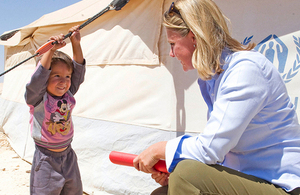New programmes to strengthen vulnerable states in Africa and more support for Syria crisis
Additional help from the UK to provide emergency aid, jobs and education, to help address the root causes of the migrant crisis.

International Development Secretary Justine Greening meeting a Syrian refugee boy in Jordan. Picture: Scott Hornby/Sun
A range of new programmes from the UK will provide emergency aid as well as jobs and education to help address the root causes of the migrant crisis, International Development Secretary Justine Greening announced today.
This new support forms part of a wider approach by the UK government to tackle the migrant crisis and will focus on the fragile and vulnerable states from which the majority of migrants are leaving. This includes Syria and its neighbours as well as a number of African countries such as Nigeria, South Sudan and Kenya.
Millions of refugees and vulnerable people affected by conflict and instability will benefit from immediate, lifesaving support such as food and clean water.
The new support will also help to create jobs and opportunities, provide protection for vulnerable groups, and address underlying causes of conflict and tension so that people are able to build their lives in the region.
The support from the Department for International Development (DFID) includes:
- aid initiatives totalling £217 million in Africa, to help approximately 2.5 million refugees and vulnerable people in the countries that the majority of migrants are travelling from or through. This includes the Sahel region, South Sudan, Kenya, Sudan, Central African Republic and Nigeria; and
- an additional £100 million in aid to help those who have been displaced as a result of the Syria crisis. This includes an increase in funding to up to £20 million for education in Lebanon this year in preparation for school enrolment in September. As the second biggest bilateral donor in response to the Syria crisis, this new funding will bring the UK’s total support to £900 million.
Justine Greening said:
We have to tackle instability and lack of opportunity in the world’s most vulnerable countries, from Sudan to Syria, Nigeria to Lebanon, if we are to get to grips with the problems causing people to flee their homes.
This new package from the UK will support at least two and a half million refugees and vulnerable people across the main countries that migrants are travelling from and through. As well as providing immediate lifesaving aid, it will create jobs and help people find work, improve health services and boost education in the longer term.
That means people who might otherwise feel they have no choice but to risk their lives by making perilous journeys to escape war or poverty instead have the opportunity to build a better life where they are.
The new support for Africa includes:
- £30 million of support for over 580,000 South Sudanese refugees – providing emergency assistance and meeting longer term needs including restoring livelihoods, education and vocational training projects;
- £18 million of support for vulnerable people affected by conflict in Central African Republic, including 170,000 refugees from CAR living in Cameroon, helping them to meet their basic needs and build their own livelihoods;
- £4 million of support for over 75,000 vulnerable and displaced people in north east Nigeria – providing emergency support for the UN and international NGOs who are responding to urgent needs for water and sanitation, and nutritional support;
- £111 million of support in the Sahel for 500,000 people affected by food insecurity and 300,000 people affected by conflict - improving their resilience to shocks and crises. DFID’s Sahel programme is also providing support to 81,000 Nigerian refugees in Cameroon and Niger;
- £38.7 million to support vulnerable people in Sudan, in particular those most affected by conflict. This will support the provision of food, clean water, access to healthcare, nutrition, education, and protection services. This will potentially support more than 400,000 people to re-establish and strengthen their livelihoods, provide nutrition services to over 500,000 people, and health services to 2.7 million people; and
- £15 million of assistance for more than 533,000 refugees living in camps in Kenya – providing support in critical areas including health, nutrition and food, water and sanitation.
The new support for Syria and neighbouring countries includes:
- initiatives to provide thousands of vulnerable people inside Syria and across the region with food, clean drinking water, relief assistance, health support and shelter;
- a focus on education, including an increase in funding to up to £20 million for education in Lebanon this year in preparation for school enrolment in September to help ensure that both refugee and Lebanese children can benefit from an education. It will also include education for more than 120,000 children inside Syria, as well as providing teaching and learning materials;
- vaccinations for nearly 430,000 children inside Syria as well as healthcare, counselling and protection services for refugee children across the region; and
- nearly 60,000 cash transfers and vouchers for refugees in Lebanon and Jordan so they can directly purchase the goods they most need.
Notes to editors
- The new programmes for Africa are part of over £4 billion the government has already committed to improving economic development, governance and security in African states as well as improving access to basic services.
- DFID’s economic development work includes a strong focus on jobs and targeting the youth population while governance and security initiatives will help to build stronger, more stable states and promote peace and respect for human rights.
General media queries (24 hours)
Email mediateam@dfid.gov.uk
Telephone 020 7023 0600
If you have an urgent media query, please email the DFID Media Team on mediateam@dfid.gov.uk in the first instance and we will respond as soon as possible.